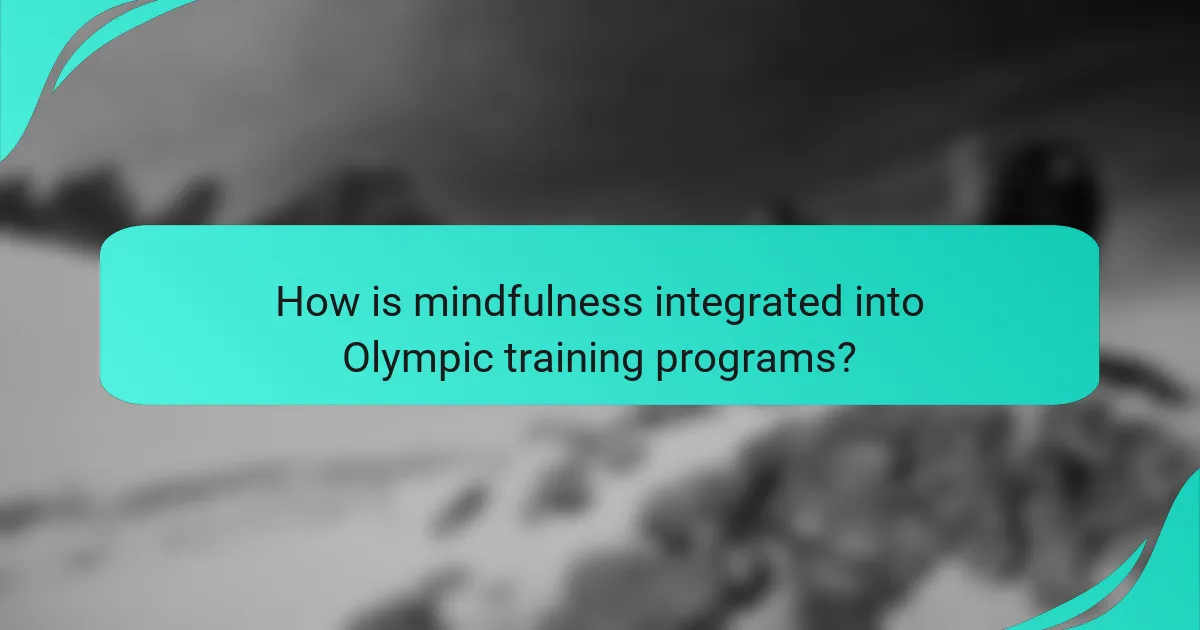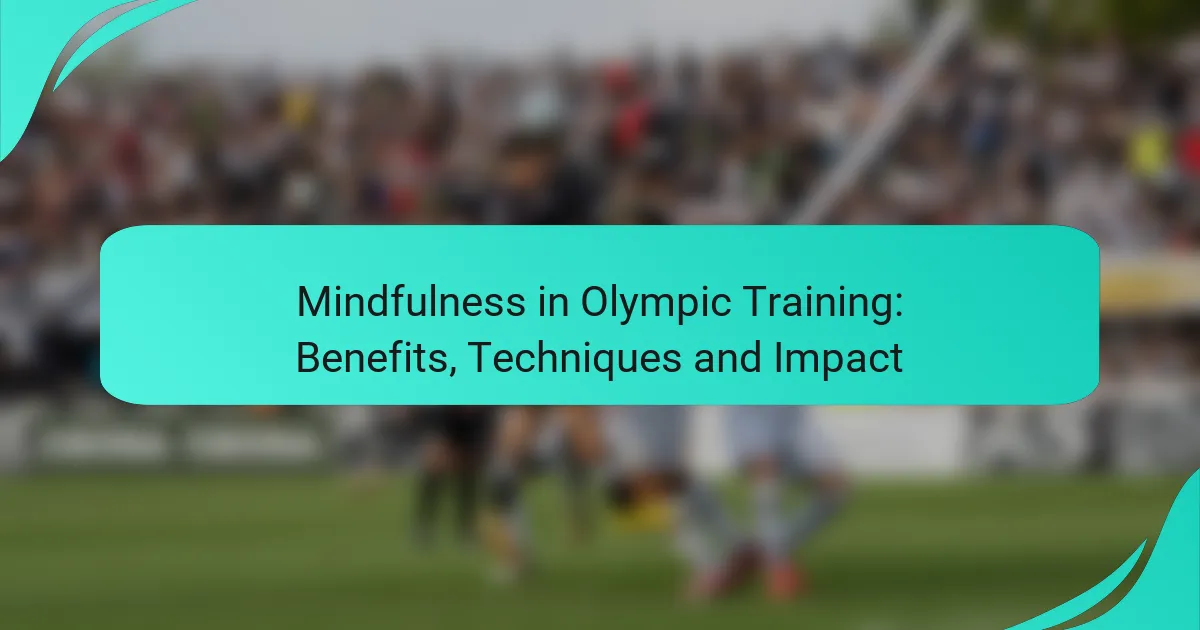Mindfulness has become an essential component of Olympic training, significantly enhancing athletes’ performance by fostering mental clarity and focus. By utilizing techniques such as meditation, breathing exercises, and visualization, athletes can effectively manage stress and emotions, leading to improved resilience and overall success in high-pressure competitions.

How does mindfulness enhance Olympic athlete performance?
Mindfulness enhances Olympic athlete performance by improving mental clarity and focus, which are crucial during high-pressure competitions. By incorporating mindfulness techniques, athletes can better manage their thoughts and emotions, leading to improved overall performance.
Improved focus and concentration
Mindfulness practices help athletes sharpen their focus and concentration, allowing them to remain present during training and competition. Techniques such as breathing exercises and meditation can train the mind to minimize distractions and enhance attention on specific tasks.
For instance, an athlete might dedicate a few minutes before a competition to practice deep breathing, which can significantly reduce wandering thoughts and improve their ability to concentrate on their performance.
Reduced anxiety and stress
Engaging in mindfulness can effectively reduce anxiety and stress, common challenges faced by Olympic athletes. By fostering a non-judgmental awareness of their thoughts and feelings, athletes can learn to manage pre-competition nerves and maintain composure.
Simple practices like visualization and body scans can help athletes recognize and release tension, leading to a calmer state of mind. This can be particularly beneficial in high-stakes environments where pressure is intense.
Enhanced emotional regulation
Mindfulness enhances emotional regulation, allowing athletes to respond to challenges with greater composure. By cultivating awareness of their emotional states, athletes can identify triggers and develop strategies to manage their reactions effectively.
For example, an athlete who feels frustration after a poor performance can use mindfulness techniques to acknowledge their feelings without becoming overwhelmed, enabling them to refocus on their goals and maintain motivation.
Increased resilience during competition
Practicing mindfulness can lead to increased resilience, helping athletes bounce back from setbacks during competition. Mindfulness encourages a growth mindset, where athletes view challenges as opportunities for learning rather than threats.
By regularly reflecting on their experiences through mindfulness, athletes can build mental toughness and adaptability, essential traits for overcoming obstacles and maintaining performance under pressure.

What mindfulness techniques are used in Olympic training?
Olympic training incorporates various mindfulness techniques to enhance athletes’ focus, reduce anxiety, and improve overall performance. These methods include meditation, breathing exercises, visualization, and body scan practices, each contributing uniquely to mental resilience and clarity.
Meditation practices
Meditation practices in Olympic training often involve techniques such as focused attention and open monitoring. Athletes may spend 10-20 minutes daily in quiet reflection, concentrating on their breath or bodily sensations to cultivate a calm mind. This practice helps in managing stress and maintaining concentration during competitions.
Common forms of meditation include guided sessions, where an instructor leads the athlete through visualizations or affirmations, and self-directed practices that allow for personal exploration of thoughts and emotions. These approaches can significantly enhance mental clarity and emotional stability.
Breathing exercises
Breathing exercises are crucial for regulating physiological responses and enhancing focus. Techniques like diaphragmatic breathing or the 4-7-8 method can be practiced in short sessions, typically lasting 5-10 minutes. These exercises help athletes lower heart rates and reduce anxiety before events.
Incorporating breathing techniques into warm-ups or cool-downs can optimize performance. Athletes should aim to practice these exercises regularly to establish a calming routine that can be accessed during high-pressure situations.
Visualization techniques
Visualization techniques involve mentally rehearsing performance scenarios to enhance confidence and preparedness. Athletes often visualize themselves executing skills flawlessly, which can take anywhere from a few minutes to half an hour, depending on the complexity of the task. This method strengthens neural pathways associated with the physical execution of skills.
Effective visualization includes engaging all senses, imagining not just the actions but also the sounds, feelings, and even smells associated with competition. Regular practice can lead to improved performance and a greater sense of control during actual events.
Body scan methods
Body scan methods focus on developing awareness of physical sensations and tension throughout the body. Athletes typically spend 10-15 minutes lying down or sitting comfortably, systematically focusing on different body parts to identify areas of stress or discomfort. This practice promotes relaxation and helps in injury prevention.
Incorporating body scans into training routines can enhance recovery and mental readiness. Athletes should aim to perform these scans regularly, especially after intense training sessions, to foster a deeper connection with their bodies and improve overall well-being.

How is mindfulness integrated into Olympic training programs?
Mindfulness is increasingly incorporated into Olympic training programs to enhance athletes’ focus, resilience, and overall performance. This integration includes various techniques and practices that help athletes manage stress and maintain mental clarity during competition.
Incorporation into daily routines
Mindfulness practices are often woven into athletes’ daily training schedules. This can include short meditation sessions, breathing exercises, or mindful movement practices like yoga. Athletes may dedicate 10-20 minutes each day to these activities, helping to cultivate a calm and focused mindset.
Additionally, integrating mindfulness into warm-up routines can set a positive tone for training sessions. Athletes might use visualization techniques to mentally prepare for their workouts, enhancing their concentration and performance levels.
Workshops and seminars
Many Olympic training programs offer workshops and seminars focused on mindfulness techniques. These sessions are designed to educate athletes about the benefits of mindfulness and provide practical tools they can use. Topics may include stress management, mental resilience, and the science behind mindfulness.
Workshops often feature guest speakers, including former athletes and mindfulness experts, who share their experiences and strategies. This peer learning environment fosters a supportive community and encourages athletes to adopt mindfulness practices consistently.
Collaboration with sports psychologists
Collaboration with sports psychologists is a key aspect of integrating mindfulness into Olympic training. These professionals work closely with athletes to develop personalized mental training plans that include mindfulness techniques. This tailored approach ensures that the strategies align with each athlete’s unique needs and challenges.
Sports psychologists may conduct regular sessions focusing on mindfulness, helping athletes to practice techniques in a structured environment. This collaboration not only enhances mental skills but also promotes a deeper understanding of how mindfulness can impact performance and well-being.

What are the benefits of mindfulness for Olympic athletes?
Mindfulness offers Olympic athletes numerous benefits, including enhanced focus, reduced anxiety, and improved emotional regulation. These advantages help athletes perform at their best under pressure, ultimately contributing to their success in competitions.
Enhanced mental clarity
Mindfulness practices, such as meditation and breathing exercises, can significantly improve mental clarity for athletes. By training the mind to focus on the present moment, athletes can reduce distractions and enhance their decision-making abilities during competitions.
Techniques like visualization and body scanning can help athletes identify mental blocks and clear their minds before events. Regular practice can lead to sharper concentration, allowing athletes to execute their strategies more effectively.
Improved physical performance
Mindfulness can lead to improved physical performance by fostering a stronger mind-body connection. When athletes are fully present, they can better tune into their bodies, leading to more efficient movements and reduced risk of injury.
For example, mindfulness can help athletes manage their breathing and maintain optimal energy levels throughout their events. This heightened awareness can translate into better endurance and quicker recovery times, enhancing overall performance.
Better team dynamics
Mindfulness can enhance team dynamics by promoting better communication and collaboration among athletes. When team members practice mindfulness together, they develop a shared understanding and respect for each other’s perspectives, which can strengthen their bond.
In team sports, mindfulness can help reduce conflicts and improve problem-solving abilities. Regular mindfulness sessions can create a more cohesive team environment, leading to improved performance during competitions.

What challenges do athletes face in adopting mindfulness?
Athletes encounter several challenges when integrating mindfulness into their training routines. These obstacles can hinder their ability to fully benefit from mindfulness practices, which are essential for enhancing focus and reducing performance anxiety.
Time constraints
Many athletes have packed schedules filled with training, competitions, and recovery, leaving little room for additional practices like mindfulness. Finding even a few minutes each day can be difficult, as they often prioritize physical training over mental exercises.
To address this, athletes can start with short mindfulness sessions, even as brief as five minutes. Incorporating mindfulness into existing routines, such as during warm-ups or cooldowns, can also help maximize limited time.
Resistance to new practices
Some athletes may be skeptical about the effectiveness of mindfulness, viewing it as a non-essential component of their training. This resistance can stem from a lack of understanding or previous experiences with mental training that did not yield immediate results.
To overcome this resistance, coaches can introduce mindfulness gradually, emphasizing its benefits through evidence-based studies. Sharing success stories from other athletes who have embraced mindfulness can also help in changing perceptions.
Difficulty in maintaining consistency
Consistency is crucial for mindfulness to be effective, yet many athletes struggle to practice regularly. External factors such as travel, competition schedules, and personal commitments can disrupt their routines.
Establishing a set time each day for mindfulness practice can promote consistency. Athletes might also consider using mindfulness apps or guided sessions to help maintain their practice, making it easier to integrate into their daily lives.

How do Olympic coaches support mindfulness practices?
Olympic coaches support mindfulness practices by integrating mental training into athletes’ routines, emphasizing the importance of mental health alongside physical performance. They utilize various techniques to enhance focus, reduce anxiety, and improve overall well-being.
Training programs focused on mental health
Training programs that focus on mental health are essential in Olympic preparation, as they help athletes develop resilience and cope with the pressures of competition. Coaches often incorporate mindfulness exercises, such as meditation and visualization, into daily training schedules.
These programs may include workshops, one-on-one sessions, and group activities designed to foster a supportive environment. For example, athletes might participate in guided meditation sessions lasting 10-20 minutes, helping them center their thoughts before competitions.
Additionally, coaches can encourage athletes to set aside time for self-reflection and journaling, which can enhance self-awareness and emotional regulation. By prioritizing mental health, athletes are better equipped to handle the challenges of high-stakes events.
